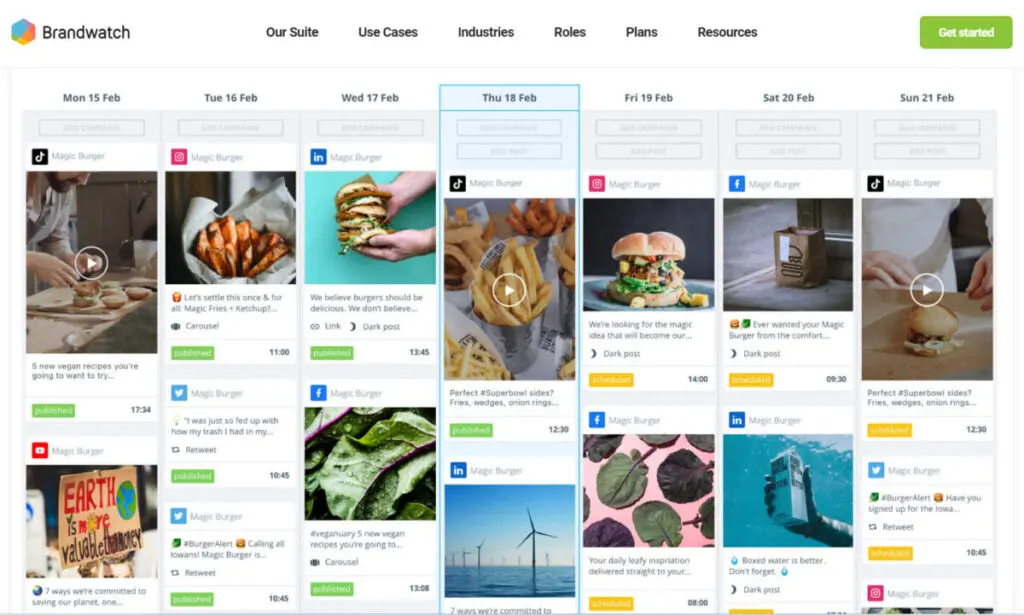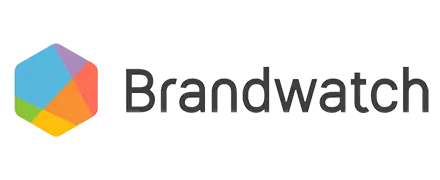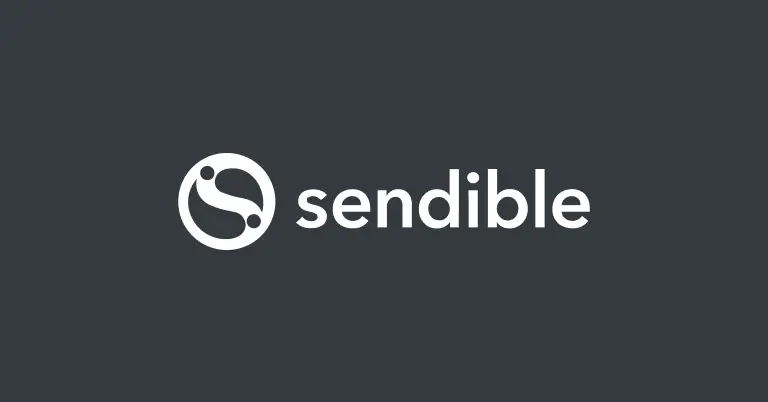As of 2024, 5.17 billion users turn to social media for an average of 143 minutes per day. At the same time, as much as 82% of users reported buying a product from watching a social media ad. With the rise of social media in the landscape of marketing, there is also an urgent need for social media marketing platforms and management systems that can help social media marketers and researchers accomplish their social media goals.
In this article, we’ll take a deep dive into the world of social media marketing platforms to learn how you can improve social media strategies, data analyses, and overall marketing prowess.
- What is a Social Media Marketing Platform?
- Major Social Media Platforms
- Choosing the Right Social Media Marketing Platform for Your Business
- The Best Social Media Marketing Platforms
- 1. Brandwatch Social Media Management
- 2. Sendible
- 3. Loomly
- Benefits of Using a Social Media Marketing Platform
- Overcoming Potential Challenges in Social Media Marketing Platforms
- Final Insights
What is a Social Media Marketing Platform?
Social media marketing entails posting on multiple platforms, measuring performance, optimizing profiles, and so much more. For social media marketers, this can understandably be a handful. Enter social media marketing platforms, which are software solutions or tools that can be utilized to implement advertising campaigns on major social media platforms in a fast, efficient, and accurate manner.
Social media marketing trends for 2024, such as short-form videos, user-generated content, engaged communities, and AI integration, are all changing the landscape of social media marketing. That being said, the services and features that come with social media marketing platforms are becoming more necessary than ever.
Social Media Marketing Platform Features and Services
Although it differs from platform to platform, social media marketing platforms often have a set of features and services to help social media marketers mount their marketing campaigns. Here are a few key features that a social media marketing platform typically offers.
Social Media Dashboard – This feature allows marketers and social media analysts to efficiently oversee multiple accounts across different social media platforms. Most of the time, these dashboards are highly customizable according to your needs. To optimize your social media dashboard, we recommend taking the following steps:
- Define your overall marketing goals and set your target audience. This step helps you determine the details that you want to focus on when accessing your dashboard. For instance, if your goal is to increase post engagements, set your dashboard to monitor user engagement in real-time.
- Make use of charts, graphs, and other visual components in your dashboard. This significantly simplifies the large amounts of data you are receiving from different platforms, making monitoring much easier and more productive.
- For best results, don’t be afraid to experiment and play around with your dashboard. Test which tools and features give you the results that you need to further optimize your campaign.
Post Analytics – This gathers crucial data regarding your post, video, or article’s performance and tells you how it resonated with your target audience. Here are some ways to leverage your post analytics data:
- Try out different content ideas, styles, and formats to see which kind of content performed the best in each of your social media accounts. This allows you to bank on the content that your audiences engage the most with.
- In the same vein, determine patterns about the best posting times for different content types and formats. Optimal posting times are key in reaching your audiences efficiently.
Content Calendars – Social media marketers can utilize content calendars to plan ahead and post content at certain schedules, ensuring that content is delivered consistently. Take note of some ways you can further optimize your content calendar here:
- Understand the customer journey and plan accordingly. This can help you plan content months ahead when you create posts that cater to the awareness, consideration, and retention stages of your customers.
- Post analytics and content calendars work together to deliver the best content at the best times they’d be seen by your target audience. Figure out which times and days of the week your content receives the largest reach, impressions, or engagements and schedule your posts within those durations for the best results.
Audience Engagement – This feature provides an avenue for social media marketers to reply to and be involved with their audiences’ comments, mentions, and messages. Since this is important in building and connecting with your community, here are some recommendations to maximize this feature:
- Incorporate prompts or calls to action in your content. This encourages relevant discussions and engagements on your post that can help your audience feel more connected with your brand.
- Identify business-relevant engagement, especially inquiries and reviews—both positive and negative. Prioritize responding and engaging with these to improve customer experience and support.
Social Listening – Sentiment analyses allow marketers to gain a deeper understanding of how their audience feels about certain brands and businesses through measured data. This feature also works well with audience engagement, as it can help you scan the landscape of what your customers are saying about you. Here are a few tips to use social listening to your advantage:
- Determine what you want to “listen” for. Social listening tools allow you to input certain keywords or brand and product mentions, even without your customers directly tagging your social media accounts. For example, if you want to know what people are saying about a certain product, input the product name into your social listening tools.
- Use the tool to monitor your competitor’s engagements aside from your own and compare and contrast what people are saying about other businesses versus your own. This way, you can have a more comprehensive grasp of what customers voice out about your line of business and optimize your campaign strategies accordingly.
These are just a few examples of the services that a social media marketing platform can offer. This makes it important to thoroughly assess each one before choosing the right platform for your business. As you read further, we’ll offer some tips and tricks to help you choose the right social media marketing platform for your needs.
Major Social Media Platforms
Before delving into how social media marketing platforms can improve your brand or business, it’s best to first learn about the social media platforms that have made waves in the digital marketing space. Here are seven major social media platforms and how to maximize your brand’s reach on each of them.
1. Facebook
With 3 billion monthly active Facebook users, Facebook has understandably made itself a social media marketing giant, especially through its advertising tools. Utilizing Meta ads can help a brand or business build awareness, increase sales, drive traffic, and generate engagement.
2. Instagram
There are approximately 1.4 billion Instagram users worldwide, which makes it an essential platform for sharing photo and video ads. Instagram is also under Meta, which means marketers can use Meta ads to launch marketing campaigns on the platform.
3. TikTok
TikTok is relatively new to the social media marketing scene compared to the others in this list, but by no means should it be underestimated. With over 1.6 billion users—most of whom are aged 25 and under—TikTok is the up-and-coming platform for those targeting younger audiences.
One of the reasons why TikTok is so popular is because of its emphasis on short-form, easily digestible content that makes immersing users in the app so much easier. Furthermore, make use of TikTok Spark Ads to boost your reach.
4. X (formerly Twitter)
Although the recent rebranding of Twitter as X has caused controversies, there are still over 600 million users on the platform. The combination of this extensive user base and the platform interface allows for easier engagement farming and community-building.
5. YouTube
YouTube has always been the go-to platform for long-form content, but it has also evolved in terms of short-form reels and livestreams. Its user base now reaches an impressive 2.7 billion monthly active users. If you want to maximize your reach on YouTube, you can try sponsored ads and influencer partnerships.
Choosing the Right Social Media Marketing Platform for Your Business
Being familiar with social media giants is crucial in selecting the social media marketing platform that best fits your business. Although there are common features and services offered across all social media marketing platforms, there will also be tools that can specifically cater to the social media platforms that you choose to drive your marketing campaigns.
This section will review and examine some general features of social media marketing platforms to help you make an informed decision about choosing the platform that aligns with your overall marketing objectives. We’ve outlined some of the most significant components you should consider below.
Platform compatibility
Before anything else, you must ensure that the platform is compatible with you and your team in more ways than one. Look for a platform with a user-friendly interface that simplifies the process of social media management. Aside from that, check if the platform is capable of handling multiple team members, client collaborations, and varied social media platforms.
Must-have features
If you have specific social media goals in mind, a social media marketing platform should provide you with an avenue to achieve those goals as effectively as possible. As such, it’s best to create a list of mandatory features and cross-check which platforms offer these must-haves.
Unique tools
Standing out from the competition is one of the tenets of a good business. Look for a social media marketing platform that not only offers must-have features but also unique tools that can give you an edge in the competitive landscape.
Budget-friendliness
As the saying goes, you have to spend money to make money. When scouting for a social media marketing platform, ensure that the costs that it will incur are within your marketing budget.
Customer testimonials
At the end of the day, a social media marketing platform is an investment—so make sure that the platform of your choice is tried and tested. Look for customer reviews, testimonials, and success stories to help you make an informed decision.
The Best Social Media Marketing Platforms
To help you get started, here is a list of some of the best social media marketing platforms according to features, customer support, and reviews. For a full list, feel free to check out our article on the top social media marketing platforms in 2024.
Brandwatch is an all-around platform for consumer intelligence, social media management, influencer marketing, and developer APIs. It boasts a roster of impressive clients from different industries thanks to the magnitude of tools and services it offers. Furthermore, Brandwatch provides detailed resources and guides to succeed in social media marketing. Sendible offers must-have features for social media management—however, it also prides itself on its clean, intuitive interface, affordable pricing, and stellar customer support. With over 30,000 agencies, marketers, and brand managers, it comes as no surprise that it is an award-winning platform in the social media marketing industry. Loomly is committed to providing stress-free social media management. This platform is great for brands and businesses that aim to cater to a wide range of social media platforms. It’s also compatible with project management tools like Slack, Microsoft Teams, and Zapier, making social media management efficient and collaboration-friendly. 1. Brandwatch Social Media Management
2. Sendible
3. Loomly
Benefits of Using a Social Media Marketing Platform
Using large social media platforms such as Facebook and Instagram can help establish your business presence online. However, utilizing the different tools and services of social media marketing platforms can translate into success more directly and efficiently.
If you’re still hesitant about using social media management tools like the ones listed above, we’ve outlined some of the key benefits of utilizing these social media marketing platforms in driving the growth of your business below.
1. Increases visibility and reach
The ability to monitor over and post to different social media accounts from one tool is a great asset in widening the reach of your content in less time. Melía Hotels International, for example, operates over 400 social media accounts across different organizational levels and regions.
By taking advantage of common social media marketing platform features such as content libraries and content calendars, Melía successfully distributes content among multiple social media accounts quickly and methodically—thus allowing them to share synchronized content for a wider reach.
2. Fosters engagement and connections
To build a community and connect with an online audience, maintaining consistent engagement is crucial. Social media marketing platforms have the tools any brand or business needs to see and reply to comments, messages, and replies from followers and fans of their social media pages, effectively creating organic relationships.
This doesn’t just apply to customers—it can also apply to clients as well. TravelMedia.ie attributes their success to the use of social media marketing platforms, especially with the community engagement feature. The platform allowed them to see comments in real time, coordinate with clients efficiently, and foster connections to their target market.
3. Aids in strategy optimization
The services offered by social media marketing platforms can be a great asset in optimizing campaign strategies based on trends and audience feedback. Access to campaign performance measurements, sentiment analyses, and demographical data are some of the features that any social media marketer should fully maximize.
According to Prashant Mistry, the Social & Digital Insights Lead at Samsung, these social data significantly contribute to the successful social media campaigns mounted by Samsung. Knowing the current trends, pain points, and insights of their audience allows them to conceptualize campaigns that specifically cater to target markets and even avoid potential crises.
4. Enhances social media management
Utilizing a social media marketing platform will consolidate all of your brand or businesses’ social media management needs, therefore creating a more optimized, efficient workflow for you and your team. This is especially helpful for businesses with multiple franchises or branches.
For Be My Social, a digital marketing agency in the UK, using a social media marketing platform cuts down manual labor and allows efficient collaborative work, effectively increasing the team’s productivity and driving the agency’s growth.
5. Drives sales and profit
As mentioned earlier, social media has become one of the most prominent forces behind driving online sales. With the increase of awareness, reach, and engagement that social media marketing platforms provide, it comes as no surprise that these will also translate into profit growth.
Even small businesses like Apricotton have significantly benefited from the use of a social media marketing platform. After implementing an online contest, they saw a 108% increase in sales in the span of two weeks.
Overcoming Potential Challenges in Social Media Marketing Platforms
In the world of marketing, facing obstacles is inevitable. Social media marketing, on its own, has plenty of challenges that marketers and analysts have to overcome.
Using social media marketing platforms is no different. Third-party platforms can be tricky and unpredictable; therefore, learning about the potential challenges you may face is a great asset in handling any unexpected hurdles.
Platform errors and algorithm changes
Social media marketing platforms can be vulnerable to system errors and technical glitches, especially if the site is undergoing platform or algorithm changes. This can impede your social media content. To avoid this, equip yourself with back-up content and make sure to closely monitor your social media posts in real-time.
Data security concerns
Connecting your business’ social media accounts to a third-party platform also opens the possibility of security breaches that may expose your accounts to significant risk and even potential harm. Ensure that the social media platform of your choice offers a detailed data privacy policy before signing up.
Budget constraints
Social media marketing platforms will come at a price. Before committing to the monthly costs of utilizing a social media marketing platform, take a look at your resource allocations and decide which platform best fits your financial constraints.
Final Insights
The opportunities in social media marketing are never-ending—and using social media marketing platforms can help you seize them to gain a competitive advantage for your business. With the right social media marketing platform, you have the means to understand your audience, engage with your community, and grow your brand.











